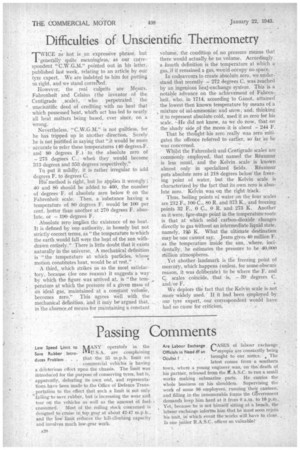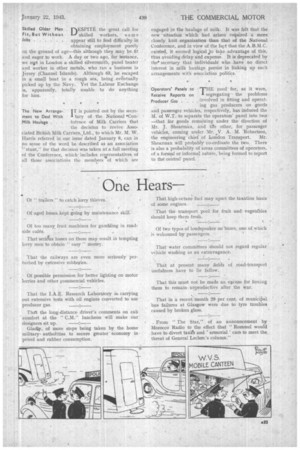Passing Comments
Page 22

Page 23

If you've noticed an error in this article please click here to report it so we can fix it.
Low Speed Limit to lkAANY operators in the Save Rubber , Intro''U.S.A. are complaining duces Problem . that the 35 m.p.h. limit on
• commerci0 vehicles is having a deleterious effect upon the chassis. The limit was introduCed for the purpose of conserving tyres, but is, apparently, 'defeating its own end, and representations have been made to the Office of Defence Trans-portatiOn to the effect that such a limit is not only failing. to save rubber, but is increasing the wear and tear on the vehicles as well as the amount of fuel consumed. Most of the rolling stock concerned is designed to cruise in top gear at about 42-47 m.p.h., and the low limit reduces the hill-climbing capacity and involves much low-gear work.
A20
Are Labour Exchange CASES of labour exchange, Officials in Need 6f an ‘—'myopia are 'constantly being Oculist ? . . brought to our notice. „ The latest comes from a southern town, where a young engineer was, on the death of his partner, released from the X.A.S.C. to run a small works making submarine parts. He carries the whole business on his shoulders, Supervising the work of some 50 employees, Opining their canteen. and filling in the innumerable forms the Gtvernment demands keep him hard at it from 6 a.m. to 10 p.m, Yet, because -he is not himself sitting at a bench, the labour exchange inforThs him that he must soon rejoin his unit, in' which event the works wilt have to close. , Is one junior R.A.S.C. officer so valuable? DESPITE the great call for skilled workers, some appear still to find difficulty in . obtaining employment purely on the ground of age—this although they may be fit and eager to work. A day or two ago, for instance, we irwt in London a skilled silversmith, panel beater and worker in other metals, who ran a business in Jersey (Channel Islands). Although 63, he escaped in a small boat in a rough sea, being .eventually picked up by the Navy. Yet the Labour Exchange is, apparently, totally unable to do anything for him. Skilled Older Men Fit, But Without
Jobs
The New ArrangeIT is pointed out by the secre
rnent to Deal With L tary of the National 'Con Milk Haulage . . fetence of Milk Carriers that the decision to revive Associated British Milk Carriers, Ltd., to which Mr. M. W. Harris referred in our issue dated January 8, can in no sense of the word be described as an association ." stunt," for that decision was taken at a full meeting of the Conference, whichincludes rearesentatives of all those associations the members of which are engaged in the haulage of milk. It was f,elt that the new situation which had arisen required a more closely knit organization than that of the National Conference, and in view of the fact that the A.B.M.C. existed, it seemed logical Jo take advantage of this, thus avoiding delay and expense. It is deprecated by the' secretary that individuals* who . have no direct interest in milk haulage persist in linking up such arrangements with association politics.
THE need for, as it were, segregating the problems involved in fitting and operating gas producers on goods and passenger vehicles, respectively, has induced the M. of W.T. to separate the operators' panel into two —that for goods remaining under thedirection of Mr. J. Shearman, and fife other, for passenger vehicles, coming under Mr. V. A. M. Robertson,
the engineering' chief of Lon"don Transport. Mr. Shearman will probably co-ordinate the two, There is also a probability of areas committees of operators, of a formal or informal nature, being formed to report to the central panel.
Operators' Panels to Receive Reports on Producer Gas . .




























































